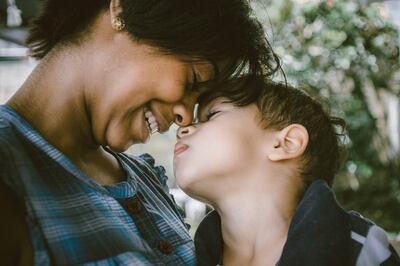It’s the most important job in the world and probably one of the toughest.
When it comes to raising children, many modern parents are determined to do it with love, warmth, compassion and mutual respect. This approach is often called ‘positive parenting’, and experts say a growing number of parents in the UAE are seeking to adopt it.
Here, The National explores positive parenting, how to practise it, and how parents can forgive themselves when they fall short.
What is positive parenting?
Imagine having someone looking over you and who always tries to see the best in you.
Imagine this person making an effort to connect with you, before they try to ‘correct’ you.
Imagine this person showering you with attention when you display behaviour they like and withdrawing attention — without hurting you — when you do the opposite.
This is what it might feel like if you are on the receiving end of ‘positive parenting’.

“Positive parenting is an approach to discipline to help parents develop a strong, mutually respectful relationship with their child in a way that promotes self-esteem and encourages co-operation,” says Jacqui Lawson, a counselling psychologist at Insights Psychology in Dubai.
When it comes to positive parenting, it’s important for parents to understand a bit about how children’s brains develop, she says.
This is to avoid parents expecting more from their children than they are capable of. For example, the rational part of a child’s brain can often become ‘hijacked’ by the emotional part. This makes it hard for them to problem-solve or behave appropriately when faced with situations that feel overwhelming or threatening to them.
How to practise positive parenting
Positive parenting involves matching your child’s pace and supporting him or her to find ways to cope.
Parents should try not to take their children’s unwanted behaviour personally, says Lawson. Children’s behaviour always serves a function for them and may be caused by a dysregulated nervous system and the emotional brain taking over.
“Although parents can help and guide, at the end of the day they can’t control their child’s behaviour,” she says. “But they can control their responses to it.”
Parents caught in conflict with their child can reframe the situation by saying to themselves, 'he [or she] is having a hard time,' instead of thinking, 'he’s giving me a hard time,' she adds.
Positive parenting can take a great deal of effort, as it involves countering the brain’s survival mechanism which focuses on the negative, says Lawson.
When parents are under stress, it can be even harder to focus on the positive. That’s why it’s important for caregivers to practise self-care and mindfulness.
“Practise mindfulness, that is purposefully bringing one’s attention to the present and, in particular, practise gratitude,” says Lawson. “Not only as a way for parents to manage their own emotions … but also to help train the brain to focus on a child’s strengths.”
Mothers, in particular, feel pressure to be positive all the time, she adds. It’s hard work.
“I often tell my clients that children don’t need perfect parents, they need coping parents,” says Lawson.
This means role models who show that they can use their coping skills to deal with life’s difficulties.
Boundaries within positive parenting
Using ‘descriptive praise’ is another positive parenting strategy, says Therese Sequeira, parent educator at KidsFirst Medical Centre in Dubai.
Direct feedback about specific actions is better than general praise, which can feel artificial. For example, saying “thanks for helping me carry the groceries inside”, could be very effective and encourage more of the desired behaviour.
Talking to kids about their interests, showing affection, and encouraging independence are all vital aspects of positive parenting, adds Sequeira.

“Hugs, kisses, touch, tickles, holding hands, sitting closely,” she says. “When parents show affection with their kids, children learn their parents' care for them and are interested in them, and they will learn to feel comfortable with giving and receiving affection from other people who are close to them.”
Positive parenting still means putting down firm and fair boundaries and shouldn’t be confused with permissive parenting, says Lawson.
Nor is it the same as ‘helicopter parenting’, which refers to parents who hover around their child ready to swoop in and ‘rescue’ them at the first sign of trouble.
Although the parents may mean well, this style largely benefits the parent because it helps them feel more at ease and in control, says Lawson.
By contrast, it can be detrimental to the child because it reduces opportunities for them to problem-solve or cope with failure.
One limitation of positive parenting is that it can take time to observe changes, says Lawson. This can be very difficult for parents, especially if their child’s displaying harmful behaviour.
Busy parents can also be hard pushed to find 10 to 15 minutes of ‘special time’ to spend with their offspring every day, she adds.
This is a requirement of a positive-parenting strategy. Parents devote time each day to an activity of their child’s choice, to help them bond.
In recent years, Sequeira, who runs parenting courses, has seen more parents in the UAE seeking support to adopt positive-parenting styles.
Similarly, Lawson says her clients often want advice on finding a parenting style that fits their family values and which both parents can support.
Her advice to parents is to accept that sometimes they will get things wrong.
“It’s virtually impossible to be positive and calm all the time,” she says. “The main thing to remember is that you too are human, and mistakes are there for learning.”





